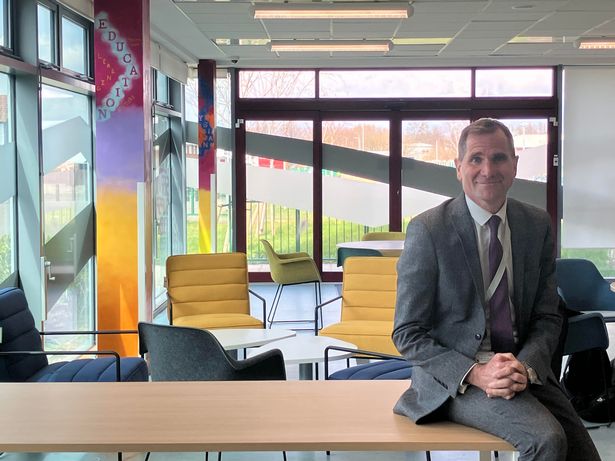Since it brought in a strict no phones on in school policy Cardiff West Community High has seen dramatic results.After banning mobile phone use in school last summer term Cardiff West has seen a 60% fall in exclusions, attendance has risen from 80% to 83% and there's been a 72% reduction in fights. Pupils are talking and communicating more and are focusing more in lessons, staff say.
The ban applies to all staff and all 1,100 pupils aged 11 to 18 and overall, the teenagers say they are glad. Their comments come as debate over phones in schools continue with a Senedd committee recommending no outright ban.Never miss a Cardiff story by signing up to our daily newsletter here

Worried about the toxic effects of social media, staff were shocked when a survey they carried out found pupils were on their devices 12 to 13 hours a day. It means, since last summer, the school has a no-use phone policy in place. It has resulted in better engagement in lessons and improved behaviour, says headteacher Mike Tate. While he can't quantify the effects on mental health and happiness, the signs are the policy has impacted children in those areas too.
Cardiff West brought in the policy that phones must be switched off and not used in school because staff were growing increasingly concerned about the negative effects of smartphones and social media on learning, socialising and mental health.
A snapshot survey by the school showed that on average their pupils were on their phones an astonishing 12 to 13 hours a day. Some pupils say that since the ban, their use has halved. They say they were initially wary of it at first, but now support the ban.
Cardiff West's radical policy, now being looked at by other schools, says pupils and staff may bring in phones but they must be in their bags, switched off and not used, or looked at, on the school site. The school accepts pupils may need their smartphones on their journeys to and from school, but once they cross onto school grounds, they must go off.
Any pupil found using a phone will have it confiscated and returned at the end of the day, with between five and seven a day confiscated on average. Pupils say they are more confident and have made more friends since being told to staff off their phones during school time.
The drop in exclusions relating to "defiance" is equal to around 50 to 60 fewer exclusions in the last eight months while reportable issues of non-exclusion worthy defiant behaviour have halved, says, Mr Tate.
The headteacher and his team started to look at phone use when they noticed an issue with behaviour and defiance when pupils were asked to put them away during lessons. They were also worried about links between social media, phone use and mental health.
"Mobile phones impact concentration and focus," says Mr Tate, "We spent the spring term 2024 consulting staff, pupils, parents, unions and governors and held assemblies. We spoke to pupils about the impact of mobile phones on their mental health. A simple policy was drawn up, carefully planned and thought out that phones should not be seen or heard in school."
"Old style" paper school planners have been re-introduced so that pupils don't have to look on "class charts" on phones to see their timetables or work. Staff and pupils use ipads or chromebooks if they need to go online, email or check timetables during the day.
No staff can use phones either, instead using walkie talkies to communicate from around the site.

Mr Tate said problems caused by social media are well known and filter into schools nonetheless, but this has reduced too since last summer's policy change. At breaks and lunch pupils talk more, are learning to communicate better and playing more games together, all of which has improved overall social interaction.
"You could see the issues arising following weekends with issues with Tik Tok and other social media that we were dealing with in school. Now we see pupils talking more and playing cards in breaks," he said.
He says the no phone policy works because of its simplicity and consistency of approach sticking to it. There are no grey areas for staff and pupils to debate. "There is no need for a mobile phone in this school, the benefits of being mobile free outweigh the negatives," says Mr Tate.
Cardiff West High serves one of the most economically deprived parts of Wales. Seven in 10 pupils are eligible for free school meals and more than nine in 10 live in the 10 most deprived area of Wales but Mr Tate is determined his pupils should do well. "In raw data we are the most economically challenged school in Wales but we are not the most challenged school," he said.
The mobile phone policy goes hand in hand with his efforts to raising attainment, cutting absence and exclusion and generally improving the life chances of young people. The headteacher said parents have mostly responded positively to the phone policy and some have told him their children have cut their phone use outside school too, with positive results.
Asked whether he thinks mobile mobiles should be banned in all schools Mr Tate is cautious, despite his school's success. He'll say only that: "There is no place for phones here but it is very difficult for me to talk about other schools."
Year 11 pupils Lanre Olasupa and Ameira Barratt, are less compromising. They say that while they didn't want a ban at first and found it hard, they now think all schools should adopt the same policy.
The 16 year-olds, both about to sit their final GCSEs, say they are more confident and outgoing since not being allowed to use their phones in school. They say they needed to be helped to think about and cut their screen time.

Lanre, who aims to become a civil engineer, admits he used his phone 13 hours a day mostly on football games, but also social media. That has now more than halved.
The teenager says he's made new friends and has learned to be less shy striking up conversation and speaking to new people. He admits that not being allowed to hide behind his phone was "hard at first". "In breaks and lunch you are so used to checking your phone. The ban helped me speak to people more," he said.
"It was quite stressful because I had to speak to people and it was out of my comfort zone I am more confident now and am really glad the ban came in. With social media you see things and start judging your life and that's not good for your mental health. I have noticed students are now more focussed in lessons and I've made new friends and talk to more people," the teen said.
Lanre is about to sit nine GCSEs and wants to go to college for A levels. He hopes he will continue to curb his smartphone use when he leaves Cardiff West this summer.
Ameira says she has a good group of friends. The group has got closer since talking more at school without hiding behind their phones. The teenager, who wants to study psychology, is interested about the effect on young people of phones and social media: "I was always on my phone and before I would get it out at break and lunch.
"It was a shock at first not being able to use my phone, but I am quite shy and it's given me more confidence. I was using my phone around eight hours a day but now more like four or five. I have noticed there is less defiance in lessons and less interruption. Teachers used to stop lessons and argue about phones but now they are just taken away.
"We are an evolving generation with mobile phones and as a girl I think mobile phones can be quite toxic. People put out their perfect life on social media and it's not actually true. As young adults sometimes you just need someone to tell you what to do."
Both teenagers feel that their confidence has grown since being told to put their phones away in school.
Receive the latest news on AI Financial Navigator 4.0